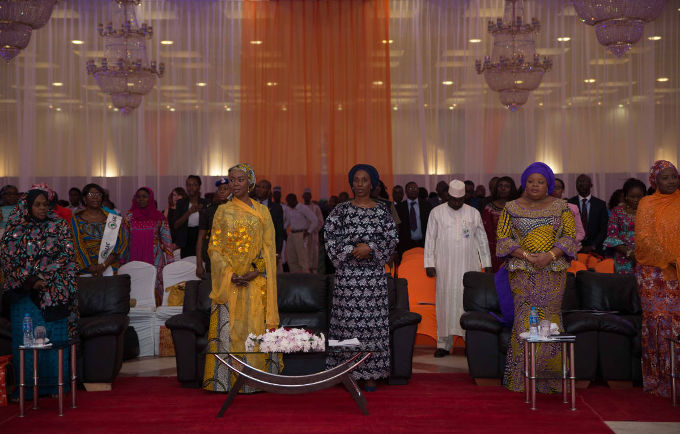“I hear the cry of a little girl, she cries from the pain afflicted on her, she cried yesterday, cries today and may cry tomorrow, will you help me stop the pain?” Her Excellency (H.E), Mrs. Dolapo Osinbajo, the wife of the Vice President of the Republic of Nigeria gave a collective call for everyone to join the campaign to end FGM in Nigeria. Mrs. Dolapo Osinbajo represented H.E Mrs. Aisha Mohammadu Buhari, the Wife of the President.
The national response to eliminate the practice of Female Genital Mutilation/cutting in Nigeria was launched in Abuja on 09 February, 2016. The launch was a collaboration between the Federal Government of Nigeria, State Governments and the Joint UNFPA/UNICEF Programme on FGM/C Abandonment in Nigeria.
FGM/C is an extremely harmful traditional practice, documented in 28 countries in Africa, Asia and the Middle East. It comprises all procedures involving partial or total removal of the external female genitalia or other injury to the female genital organs for non-medical reasons. Little is known about the origin of the practice, which predates contemporary world religions. It is widely practiced in Nigeria, where an estimated 19.9 million Nigerian women have undergone the procedure. According to the National Demographic Health Survey 2013, 25% of women in Nigeria have undergone FGM/C.
“It is a violation of women's reproductive rights, one that destroys her bodily integrity, perpetuated and inflicted by other women” said Mrs. Toyin Saraki, the wife of the Senate President, “It is time for us women, to think of how we can be better sisters, aunties, mothers or friends to others who are about to be victims”. “It is time to say enough is enough”, noted Ratidzai Ndhlovu, the UNFPA representative, “Our young girls have suffered enough from this barbaric act”.
Although the practice is slowly declining, a few of the myths that perpetuate the practice are ideas that FGM/C prevents young women from becoming promiscuous or that it promotes the marriageability and fertility of the woman. “Not one of the myths surrounding this practice has any basis in truth,” said Jean Gough, the UNICEF Representative, “the only truth is that on every level this is a harmful and brutal practice that has a detrimental impact on the health of women and girls.”
Cecelia a 20 year old survivor almost bled to death when her clitoris was cut at the age of 18. Recounting her story at the launch of the national response, she narrated how she was tricked by her mother to visit the village. Upon her arrival, she was taken away by two strange women. On dirt floor, her legs were spread apart and tied to a tree, while a heavy woman sat on her chest. She was restrained but she struggled notwithstanding till she was cut. “The cut was too deep”, Cecelia recounted with a shaking voice. With sobbing eyes she looked at her mother and the only response she got was “you are now a woman”.
Representing H.E, Mrs. Aisha Muhammadu Buhari, Mrs. Osinbajo said “I urge the wives of Governors particularly those from states where this harmful practice is rampant to be the voice of the campaign to end FGM/C in their various States. We have the primary role to use our privileged positions to make lives better for Nigerians (especially women and girls). I urge you to be vocal on the need for FGM/C to end in Nigeria (within this generation) and take action that will enable this to happen”.
From knowing about modern contraceptives to learning about healthy relationships, young people have a right to access comprehensive sexual and reproductive health education. However, they are prevented from accessing information on their sexual and reproductive health needs because of the stigma, cultural taboo and discrimination they may face. This is where Da Subject Matter comes in. Da Subject Matter is a mobile technology supported by the United Nations Population Fund and the Planned Parenthood Federation of America.

